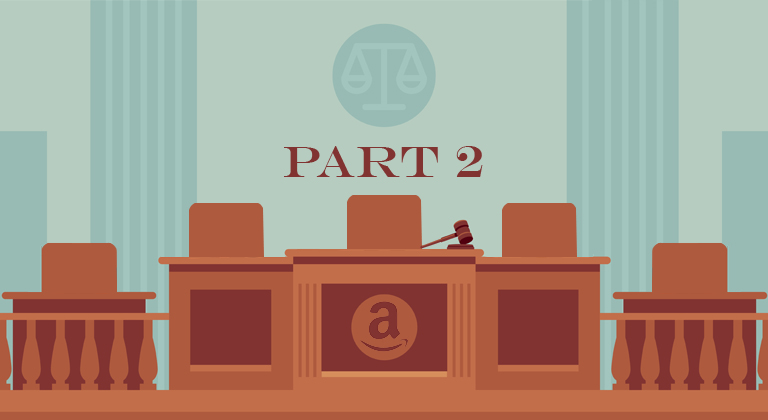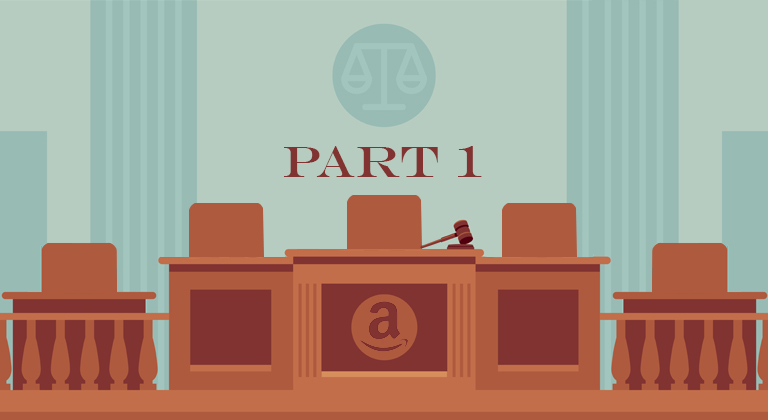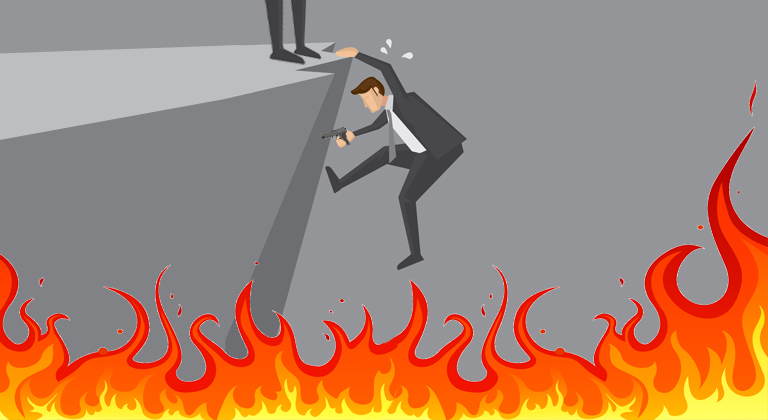An Amazon Appeals Process is Long Overdue – Part 2
In part one of this blog, I went over an issue that recently affected a number of authors in which their Amazon accounts were wrongly terminated, and the hassle and pain they had to go through to exonerate themselves. I spent a lot of time discussing what happened, how and why I think the current system works the way it does, and the realities of what I believe is unlikely to ever change (and why).
But that doesn’t mean the system can’t be vastly improved upon, we just need to make sure to ask for the right things. Today I’ll go over the changes I think Amazon would have a hard time arguing against, while still providing authors with a defense against the devastating consequences of having their entire careers unfairly ripped away.
Grant me the serenity to accept the things I cannot change, the courage to change the things I can, and the wisdom to know the difference. – Reinhold Niebuhr
We’ve always lived in an imperfect world, although these days that’s truer than ever. As authors, we also work within an imperfect system. It can be stressful, as there are so many things outside of our control and accepting what we are powerless to change isn’t always as easy as it sounds.
Last week I went over some of those things.
Most authors hate how vague many of Amazon’s rules are, and think it’s ridiculous that even those accused of breaking them aren’t told exactly what they did wrong. Unfortunately, those things in particular are ones I believe authors need to accept as unchangeable, and wasting our time and energy arguing about them will go nowhere.
But just because those things won’t change doesn’t mean there aren’t changes that could be made to vastly improve the system and processes we have to deal with.
Authors shouldn’t live in fear of waking up to find that their entire careers have been wiped away, with little to no warning, with the onus on them to figure out who to contact, how to reach them, and what is needed to convince them to have another look at their case. Because just taking another look is sometimes all that’s needed, as it was in Lexi Ostrow’s case. The current system is flawed, leading to author accounts being terminated erroneously – either by some rogue algorithm that determined they had broken a rule they weren’t even aware of, or some poorly trained front-line rep getting something wrong.
Trying to build a perfect system is an exercise in futility. Mistakes will always be made, and both authors and Amazon need to accept that. Innocent people will sometimes get swept up and unfairly accused.
It’s how those mistakes are handled that needs to change. That’s what can change.
Warnings should always precede the more drastic account termination step. A clear and easy to follow process for resolving these issues should be available to the accused, and a properly trained group or committee must be formed that are dedicated to investigating and helping to resolve these issues in a timely manner, whenever they are appealed.
Those types of changes won’t hamper Amazon’s ongoing fight against the various scams and cons that target their system and customers. But they will make the system fairer and safer for those that are doing their best to play by the rules and simply make a living for themselves and their families.
What Needs to Change?
If we can’t expect clearer rules or to be told precisely what we did wrong, what can be done to make things better?
As I mentioned above, the changes that I think would make the most impact while still allowing Amazon to continue to keep scammers and true bad actors from exploiting their system all revolve around simply implementing a clear process of warnings and appeals, with a group of properly trained staff that can be easily contacted and ready to investigate issues in a timely manner.
Broken down, there are four main changes I’m suggesting, and I’ll detail out each one to explain why I think it’s important.
(One caveat here – I know Amazon is more than just books, and while I assume most of these issues are not unique to this category and thus many of the solutions could probably be applied elsewhere, I don’t know enough about any other products or areas to comment on them, and so my suggestions here will be written specifically as they pertain to authors and our concerns.)
1: Have a clearly defined number of warnings before account termination
Of the various accounts of authors that were hit with this issue that I’m aware of, only Lexi was sent an email that could be loosely described as a warning. The others had their accounts terminated immediately, at the first whiff of Amazon determining there was an issue.
It was Lexi that got an email prior to account termination, but I refer to that as a “loosely described” warning because it was actually resolved quickly, with Amazon admitting they made a mistake and there was no violation after all. From that perspective, it shouldn’t even be considered a warning but merely a mistakenly sent email. However, as her account termination happened shortly after, and the email indicated it was due to issues with the same book as the original warning email, it’s likely that the two were related.
You can read Lexi’s account for more details on how it all went down, but essentially what happened was that during the review process of a newly submitted book, she was sent a clearly automated email that indicated her book had violated some unspecific rule and wouldn’t be published. She replied saying she believed that to be in error and got a quick response admitting that after further review it was determined she had been incorrectly blocked. The book was then approved and published, but no further details were offered (despite Lexi asking for some).
Yet just a couple of days later, Lexi was sent an email informing her that her entire author account had been terminated for violations on that very same book that Amazon had already exonerated.
Hard to say what happened exactly, but despite their correlation in time, my best guess is that the initial violation email was completely unrelated to the account termination email. By that I mean that the termination didn’t come because Lexi had been previously warned. After all, not only did Amazon admit that the initial violation email was sent in error, but none of the other authors hit with account closures reported getting any warnings at all. To me, that indicates that whatever issue it was that triggered the account termination emails occurred after Lexi’s book had been published, but it used the same flawed criteria as was used to trigger her original violation email. This resulted in her getting swept up again (along with all the other affected authors).
This indicates that an author, regardless of whether they have ever been accused of any violations in the past, can, at any time, have their accounts closed, unpaid earnings withheld, and all books removed from sale.
That is absolutely unacceptable.
An account termination should be a last resort, and only applied after prior warnings.
Now, I’m aware that Amazon has rules designed to protect themselves, that basically say they can do all of these things for any reason whatsoever, yadda, yadda. They have rules like that for the same reason they keep other rules vague, to give them the leeway to act when they need to act and dole out the most extreme punishments possible when necessary.
That gives them enormous power in the author/publisher relationship, but as Spiderman has taught us, with great power comes great responsibility. They need processes in place designed to ensure that this type of extreme punishment is only sent as a last resort.
No author should be hit with an account termination due to their first and only rule violation, and it probably shouldn’t be some forever existing running count, either. For example, let’s say the rule was one warning and then the second violation results in account termination.
If an author got a warning but then went on to publish without issue for a couple of years until some new violation was flagged, that should NOT be considered their second violation and trigger account closure.
Personally, I also think there should be more than one warning before an account is shut down, but I’m not going to come up with actual numbers because those would be completely arbitrary and definitely require a lot of thought and discussion. But assuming some number of warnings could be agreed upon, I think there are two further considerations that should be applied.
- Warnings should have a clear appeals process (as outlined in the later steps below). If the violation is resolved (no obvious intentional wrongdoing found and problem fixed to Amazon’s satisfaction) or found to be incorrectly identified as a violation in the first place, that warning should be removed from the author’s account and not counted towards the limit needed before account closure.
- Warnings should have some sort of expiration date. Even if the initial warning wasn’t resolved to Amazon’s satisfaction, there could be a variety of legitimate reasons for that, not the least of which is that due to the lack of clarity on what the issue was, the author may have been unable to resolve it properly and maybe just gave up on that book. If the author then published other books for some period of time and not had any further issues, that strike against them shouldn’t be counted forever. At some point it should expire. Maybe that’s after a month or two, or a year, or whatever. Again, I’m not proposing a specific expiration date, just that there should be one.
2: No author accounts should ever be closed automatically by AI (aka the Skynet clause)
I would love to believe that this is already the case, but I honestly don’t think that it is.
Now, I completely understand the need to resort to algorithms and artificial intelligence tools to help deal with the sheer volume of products that get submitted to Amazon on a daily basis. It’s probably the only way to really handle it, so I don’t fault them for it.
To put it in perspective, while it’s hard to find true numbers, one estimate puts the total number of new kindle books published per day around 7500. With those kinds of numbers, it really is unrealistic to think even Amazon could afford to employ humans to properly review each and every one.
However, there has to be a limit on how much power those automated processes are given. We’ve seen time and again that as good as those algorithms are, they make mistakes. Not just in the cases that led to the recent account terminations, but we see them elsewhere as well. Readers often have reviews blocked or removed due to being wrongly targeted by some automated process. And we know that they were incorrectly identified because when and if they can finally reach the right people willing to investigate, the reviews are almost invariably restored.
I specifically say the “right people”, because Amazon’s training around many of these issues is very poor (or non-existent) and I’ve seen frequent examples of front line customer service reps getting even the clearly stated rules wrong, never mind how inconsistently they handle the more vague ones. This means that when an appeal is made to the only people that can be easily reached, the poorly trained first line of support, the appeal goes nowhere. We saw this in Lexi’s case as well, where she had about 20 responses denying her any help or recognition of the problem, and only once she got the attention of an executive willing to give her issue some attention was it finally resolved – along with an admission that she had done nothing wrong in the first place.
If we can’t even trust regular Amazon employees to properly judge these cases, we certainly shouldn’t trust them to an algorithm that is going to be making black and white decisions based on an unknown set of criteria and never able to follow up for further info or judge the nuances of specific situations. Using that as a first line of defense, to flag potential issues to be further reviewed by an actual team of trained humans is fine, but it should never be used to make any final decisions.
That’s why I refer to this one as the Skynet clause. In the Terminator franchise, Skynet was the AI created by the military as an automated defense program. It was designed to analyze and neutralize threats, but eventually turns on humanity when it decides that it was its own greatest threat.
So yeah, let’s not give these algos too much independence and the ability to Terminate author accounts. We’ve all seen how well that turns out.
3: All violations and appeals should lead to properly trained and accessible humans
As I said above, I totally understand the need to employ automation to handle the sheer number of new books that get submitted, but that should only ever be used to identify potential violations that are then passed over to a human for further review before any action is taken. But this only makes sense if that human is properly trained, with a clear understanding of the rules for the products they’re reviewing.
We’re talking specifically about books here, but I think it’s important to recognize that the rules around violations likely differ based on product categories. For books you might have rules around copyright violations or offensive subject matter, for example, and those rules would not apply (at all, or at least in the same way) to other categories – for example, clothing and accessories. That category likely has other specific violations that could occur, such as counterfeit products.
It’s not enough to train a rep on violations in general, they need to be properly trained on the categories that they oversee, so that they have a clear understanding of the rules and issues of that category.
So what is really needed here is a team or committee of full time employees that are properly trained on the issues that surround books and publishing. How big this team is really depends on how many books get flagged in a day, and what they can investigate in a reasonable timeframe.
Ideally, this team would investigate every potential violation before a warning is sent, or an account is closed, but if that isn’t possible then at the very least, they should handle each and every appeal made by an author.
Even if the 7500 books a day is accurate, it’s hard to know how many of those would get flagged for review. I would like to believe that the number is very small, and thus this specialized team could investigate them all within a reasonably short turn around period. Without more information though, it’s impossible to guess. I suspect, however, that if the number is too high then that likely points to a different issue altogether. If most of those cases are false positives then your algos need to be tightened up or tweaked. If most of them are legit, then Amazon likely needs to find a more effective deterrent against people intentionally breaking the rules.
But even if they only looked at appeals, that would likely be good enough provided they could turn them around quickly – within hours or for the more complicated cases, a day or two. For those that might argue that they would still be overwhelmed because everyone, including the scammers, would appeal, I would have to disagree. I think the vast majority of appeals would come from those that were either innocent, or those technically guilty but unaware of the rule they broke and did so accidentally. In both cases, they deserve an appeal. Of the remaining offenders, the ones guilty of intentional wrongdoing as part of some scheme or scam, I would expect only the most brazen of those to ask for an appeal, and likely to their own downfall. After all, if you are knowingly doing something you shouldn’t do, would you really invite further scrutiny by asking for your case to be looked at even deeper? It’s unlikely to result in anything other than an even harsher penalty than was originally handed out. It would be far safer for those scammers to just cut and run, and if they really wanted to try ripping Amazon or their customers off again, they could just create a new account.
The appeals team mandate
The mandate of this team should be protecting Amazon and Amazon customers from bad actors, NOT punishing authors that may have inadvertently done something they shouldn’t have done. The team should be tasked with upholding the SPIRIT of the rules far more than the letter of them. Especially knowing that without a proper understanding of precisely what they did wrong, authors are ill suited to defend themselves. That’s why it’s vital that this team understand that the authors are not the enemy. That it’s absolutely possible to advocate for them while still protecting Amazon from those that wish to take advantage of their platform.
To do this, the team needs a very good understanding of the rules. However, as I noted last week, it’s quite possible that there are no more clear set of rules internally or, at the very least, that anyone beyond the highest levels have access to. But that’s not a deal breaker here, because given the mandate above, it’s actually more important that this team understand the reasoning for the rules. And I don’t think there is any reason to keep those secret. For the most part, that simply means they should understand what sort of scams and advantages the rules are designed to prevent.
To really investigate this, the team should not be afraid to contact the author for more information, and remain accessible to the author to provide that info directly, whether it be by email or phone.
4: The Amazon appeals process should be clearly defined, easy to follow, and provide quick resolution
And then finally, whatever processes are ultimately put in place need to be very clearly defined, easy to follow, and promise a fair and timely resolution.
That means that, unlike the rules they’re enforcing, the Amazon appeals process should be very detailed and clear, with no room for ambiguity. A clear and easy to follow process will provide authors with the confidence they deserve in knowing they will be able to defend themselves and their work should the need arise. This process should be posted on Amazon somewhere, and each warning or termination email that is sent should include a link to it.
Most importantly, the process needs to move quickly. Every case of an author being unfairly blocked from publishing or having their accounts closed results in a loss of income for them and their family. The longer the case drags on, the larger the impact on their lives and careers it might have.
As I said earlier, if there are so many appeals that the team is overwhelmed, that points to a different problem entirely. In a fairly designed and properly staffed system, the number of authors needing to appeal a bad decision should be low enough that no turnaround should take more than a day or two at most, with most resolving far quicker. Lexi’s case dragged on for over a week but not due to any complexity around the actual investigation into the issue. Almost all of that time was her asking for help and being completely ignored or dismissed. Once she actually found someone willing to look into her case, the resolution was almost immediate.
What now?
In most free and democratic countries, the right for an accused to face their accuser and defend themselves is pretty firmly baked in, and without being told precisely what it is you are accused of makes it almost impossible to properly defend yourself. Unfortunately, Amazon isn’t a country (even though their market cap compared to GDP makes them larger than most countries) and breaking their rules is not treated the same as committing a crime, which effectively means they can do whatever they want. You’re playing in their sandbox, you have to play by their rules.
But maybe that needs to change.
Whatever your feelings are about Amazon in general, it would be tough to argue that the eBook and self-publishing landscape would be where it is today without them. They had a large hand in building it into what it is, and many of us that work in this industry have much to thank them for.
But along with all of that comes a responsibility that Amazon needs to start taking more seriously. Yes, they have and continue to do a lot towards making their platform more secure and free from the scammers and crooks that seek to take advantage of it, but they’ve also done their best to monopolize the market and stifle their competition, limiting the options that authors have in making a living self-publishing elsewhere.
This has put many authors in a position where they rely on Amazon for their entire income, or at least a very large part of it. But as has become painfully obvious over the last few weeks, Amazon’s system provides no assurances that some rogue bit of code, or human error, won’t result in everything being taken away, with no warning whatsoever. What’s more, if that does happen, they’ve provided no process for getting everything back, leaving the onus on the author to simply flounder around, begging for their case to be heard by someone with the power to actually help.
Look, no one is expecting an infallible system incapable of error. But it’s how those mistakes are handled, how the accused are treated, that is at issue here. Even if we accept the notion that for this system to work they have to turn conventional wisdom on its head and assume all accused are “guilty until proven innocent”, there must still be a way for the innocent to be exonerated fairly and quickly. And that’s what is missing from this whole process.
There are ways to improve the system. Ways that really don’t put too much of a burden on Amazon or inhibit their ability to fight against scammers, yet would still make a world of difference for the people that choose or are forced to work within their ecosystem.
We might be working in a digital world, but the authors behind all of those eBooks are real people, many of whom rely on their writing as a sole source of income to provide for their family. Providing a clear and fair appeals process for those accused of wrongdoing is not only reasonable, but should be obvious and is completely overdue.
The only way any of this will happen, though, is if authors take a stand. Make some noise about this issue. Ensure that Amazon hears us and takes this issue seriously. We need to start talking about this issue publicly, since these days that’s the best way to get the attention of a behemoth like Amazon.
But it doesn’t have to be done in a negative way. If you go on the attack, they’ll be forced to defend, and then nothing will get done. Talk honestly and rationally. If what we’re asking for are realistic changes that are simply designed to make a one-sided system a bit fairer for the community providing the content for that system, we’ll be much harder to ignore.
What I’ve proposed are just my ideas and thoughts on what I personally think would work and be acceptable – certainly not perfect, but better, at least, than what we have now. And if you agree with these then please share this blog around on social media or to your author friends so that we can keep the discussion going and make enough noise to be heard. Or if you have your own thoughts and ideas about what should and can change, then feel free to share those instead – or even add them to the comment section below.
Either way, it’s time to stop sitting on the sidelines and expecting something to change instead of actively working towards making it happen.












This sounds really reasonable.
Amazon pulled all my books down at one point – they eventually put them all back up, but it really scared me and left me living in fear all the time.
(Once Upon a Dance)
You’ve sent all of this to Amazon, right?